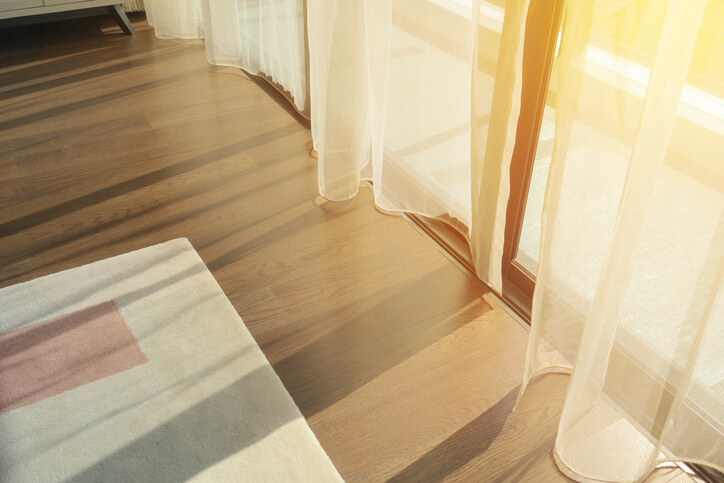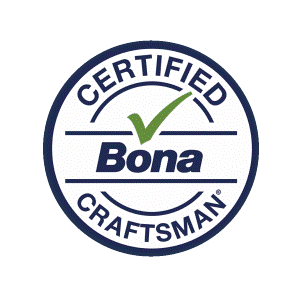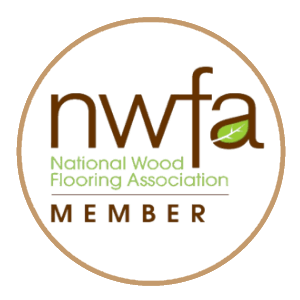How to Prevent Sun Damage on Hardwood Floors
Hardwood floors are an elegant, high-end aesthetic, offering warmth and beauty to any home. Their old-world charm mixed with a modern approach never goes out of style. Opening the curtains and flooding the room with sunlight is an exceptional way to wake up in the morning, but it’s also can cause sun damage to hardwood floors.
Sun damage on hardwood floors is a bane to homeowners, but there are steps you can take to protect your hardwood floors from sun damage while retaining the beauty of sunbeams entering your home.
What Causes Sun Damage on Hardwood Floors?
Sun damage does not mean your floors will warp or buckle, but it will darken or fade the hardwood. Wood is photosensitive, absorbing all forms of light, but it’s the ultraviolet (UV) rays you have to worry about. Hardwood absorbs the UV rays, which is comfortable on the eyes, but it also reacts with the hardwood, causing discoloration.
Generally, tropical woods like tigerwood turn darker, while domestic woods like maple or hickory get lighter.
Preventing Sun Damage on Hardwood Floors
There is no way to prevent sun damage, but you can take steps to minimize the effects. Here are a few ideas to help slow the discoloration effect while still enjoying that morning ritual.
Move Floor Coverings Regularly
Move area rugs and furniture occasionally. Although rugs can shade your hardwood from the sun, if they sit for years before you move them, you’ll notice a discoloration between the shaded and non-shaded areas. You can’t stop discoloration, but it’s best to have a universal level of change instead of patches throughout the home.
Window Coverings

Curtains can help again hardwood sun damage.
The less sun you allow into your home, the less damage to your hardwood floors. Window coverings are a perfect deterrent. To limit the UV rays from entering your home, consider the following:
- Blinds
- Curtains
- Drapes
- Awnings
- Shutters
Horizontal blinds can be slanted up so that the sunlight doesn’t reach the floor directly. Awnings and shutters prevent the sun from entering your home from the outside, so they also help with cooling the home.
Although a bit pricey, consider motorized screens. They are the best of both worlds. You can place these screens on a time so they will close automatically when the sun is highest and remain open for the rest of the day.
Window Film
Window film is a thin covering attached to your windows to block UV and IR light. It’s very similar to the darkening films used on vehicles.
Low-E Glass Windows
Low emissivity (low-E) windows have special covering filled with specific gasses to limit UV and IR exposure. These could be perfect if you’re planning on replacing your current windows or renovating.
Apply Finish
Some finishes protect against the harmful rays of the sun. They won’t stop the fading, but they will slow it down. Look at pigment-based stains, not dye stains. Pigment stains hold their color much longer.
What If My Hardwood Floors Are Already Faded?
If you already have sun damage on hardwood floors, then you’ll likely need them sanded and refinished. You can revitalize your hardwood flooring by removing the old finish and sanding away the very top layer of the wood. You’ll need a professional to guarantee the floor remains even, smooth, and properly protected.
Contact Elite for Your Hardwood Flooring Needs
Are you looking for the best ways to protect your hardwood floors? Elite Hardwood Flooring specializes in hardwood installations, dustless sanding, and hardwood finishing services.
Elite Hardwood Flooring is happy to answer any questions you have about hardwood flooring. Contact us today about any of our hardwood services if you’re looking to install new flooring, need current flooring refinished or repaired, or want advice on protecting your existing flooring.
Share

